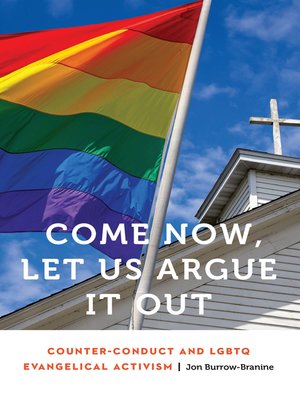Come Now, Let Us Argue It Out
ebook ∣ Counter-Conduct and LGBTQ Evangelical Activism · Anthropology of Contemporary North America
By Jon Burrow-Branine

Sign up to save your library
With an OverDrive account, you can save your favorite libraries for at-a-glance information about availability. Find out more about OverDrive accounts.
Find this title in Libby, the library reading app by OverDrive.



Search for a digital library with this title
Title found at these libraries:
| Library Name | Distance |
|---|---|
| Loading... |
Come Now, Let Us Argue It Out provides a look into a community that challenges common narratives about what it means to be LGBTQ and Christian in the contemporary United States. Based on his participant-observation fieldwork with a faith-based organization called the Reformation Project, Jon Burrow-Branine provides an ethnography of how some LGBTQ and LGBTQ-supportive Christians negotiate identity and difference and work to create change in evangelicalism.
Come Now, Let Us Argue It Out tells the story of how this activism can be understood as a community of counter-conduct. Drawing on a concept proposed by the philosopher and historian Michel Foucault, Burrow-Branine documents everyday moments of agency and resistance that have the potential to form new politics, ethics, and ways of being as individuals in this community navigate the exclusionary politics of mainstream evangelical institutions, culture, and theology.
More broadly, Burrow-Branine considers the community's ongoing conversation about what it means to be LGBTQ and a Christian, grappling with the politics of inclusion and representation in LGBTQ evangelical activism itself.
Come Now, Let Us Argue It Out tells the story of how this activism can be understood as a community of counter-conduct. Drawing on a concept proposed by the philosopher and historian Michel Foucault, Burrow-Branine documents everyday moments of agency and resistance that have the potential to form new politics, ethics, and ways of being as individuals in this community navigate the exclusionary politics of mainstream evangelical institutions, culture, and theology.
More broadly, Burrow-Branine considers the community's ongoing conversation about what it means to be LGBTQ and a Christian, grappling with the politics of inclusion and representation in LGBTQ evangelical activism itself.







